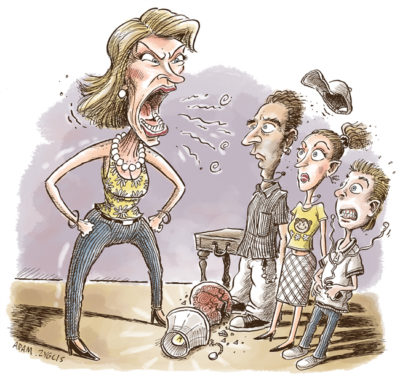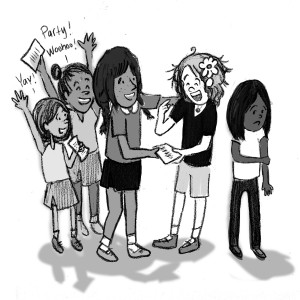|
|
April 9, 2018
 If not, what will I do without you? A minor disagreement with a best friend can be worked out with a simple, honest conversation. But a major disagreement, for example, one of you wants more time/closeness than the other, is tougher to resolve. You still need to talk about it. Sitting on feelings (like resentment and jealousy) only intensifies them. Intense feelings may lead you to doing and saying things you’ll later regret. Not good for you or the friendship.
Here’s a recent email from a girl who’s having a hard time dealing with jealousy in a friendship.
Teen: Me and my best friend have been close for quite a long time, but I know the friendship is on the verge of unhealthy. I value the friendship more than she does, which means I put way more effort into it. I get jealous whenever she spends time with other people. I’ve tried to step back and give her space, but I miss her already. I know that we can’t be friends like we used to be, but I don’t know how to stop these feelings. When the friendship ends she’ll move on with her other friends and I’ll be heartbroken. What do I do? Thanks 🙂
Annie: This friendship sounds a bit unbalanced. That’s not necessarily a bad thing. Sometimes one friend has a busier schedule than the other. That doesn’t mean she cares less than the one who has more free time. Sometimes both friends feel the need for “time together and time apart.” That gives both people a chance to explore other friendships and other interests. This can be a good thing even if it feels strange at first.
The real measure of friendship is not the amount of time. It’s how both people feel when they are together. It sounds like you feel unappreciated by your friend and jealous of how happy she is with other people. You said it yourself, “I value the friendship more than she does.” Yes, it seems that’s true. That’s a problem because it makes you feel powerless and unworthy. Like you don’t count.
Here’s something to think about: We can get so used to things in a friendship (who puts in more effort/who values the friendship more, etc.) that it all seems normal. There is nothing normal about feeling like you don’t count in a friendship! You count as much as much as she does. You deserve a friend who wants to be with you as much as you want to be with her. That doesn’t mean you two have to be together all the time or that neither of you can have other friends. It simply means that when you are together, you ought to feel accepted, respected and appreciated. If you don’t then it’s time for you to stand up for yourself. Either you can talk to her about her behavior or you can take her behavior as a clear sign that she is less interested in this friendship than you are.
If that’s the case, I’d suggest you go shopping for a new best friend.
Teen: That makes so much sense, thank you. I just don’t know how I’m gonna cope without her and I’m not exactly the kind of person who makes friends easily. Any tips?
Annie: First make a list to help you understand what qualities are important to you in a friend. Fill in the blank to this sentence:
I want a friend who is ___________________________.
Keep filling in the blank until you run out of ideas. This list will help you understand what you’re looking for and how to recognize it when you find it. Also, please know that a friendship is a two-way street. Make sure that you are able to give to a friend the same things you expect a friend to give to you.
Good luck!

April 19, 2017
 What did I do to deserve such rude and disrespectful kids?! Bullying prevention begins at home. A child’s propensity for being aggressive and/or putting up with aggressive behavior from others may begin at home as well. As this email suggests, however, rushing to judgment about what’s going on in someone else’s family, isn’t helpful.

October 28, 2015
 Forever may be shorter than you think The emails from girls who have been “dumped” by a BFF and “replaced” by their ex-BFF’s new BFF continue to pile up. I get several every day. And while it’s normal to feel upset when the person you’ve been closest to no longer gives a fig for your friendship and it’s helpful to reach out to someone you can trust, you’ve got to ask yourself: what can I do besides feeling like crap?
If you’re a teen, this one’s is for you. I’m going to tell you how to use your power in ways that will make you feel good about yourself… not like the “thrown out pickle on a hamburger” (as one 13 year old so eloquently put it.)
If you’re the parent of a teen, this one’s for you too because even when your girl feels “helpless” there are ways you can help her through this rejection.
Hey Terra – My BFF and I have been really close for 3 years. Last year I became close with another friend. I treated them both like my best friends and I had no idea my first BFF was kinda jealous of the other, she never told me. I felt her drifting away. Then she started getting close to a newcomer and calling her her best friend! I felt replaced. I am getting jealous and I really wish I can have my best friend back. It hurts everytime I see their pictures together. They are always hugging each other and holding hands, which I dislike because she never did that with me. It really hurts at the moment because I can feel my friend ignoring me. I feel so lost Terra, please help me. – Lost and Hurting
Dear Lost and Hurting,
It’s not easy to feel “replaced” in the heart of someone you really care about. I’m sorry you’re hurting. Maybe I can help.
I think it’s interesting that the first half of your email describes the feelings of jealousy your friend experienced when you got close to the other girl. You are intelligent and you’ve probably already noticed the situation has flippednow you’re feeling the same way she did!
The question to be answered is: What can you do about this?
You cannot control your friend’s feelings or thoughts or behavior. If she wants to spend more time with the other girl and if she wants to call the other girl her best friend, you have no control over that. But you do have control over how you respond from this moment on.
If it hurts or makes you jealous to look at their pictures then don’t look. Stop hurting yourself this way. Choose to stay away from her FB page or Instagram or whatever. Likewise, if you feel jealous when you see them hugging each other then stop following them with your eyes. And if you see them, by chance, look away. These choices are within your power.
You don’t say how long this has been bringing you down. I hope not too long. You can choose to continue feeling sad, jealous and rejected if you want to. I wouldn’t recommend that! Instead, I’d recommend that you think about new friends. Start with a list where you fill in the blank to complete this sentence: “I want a best friend who is—————.” Think about all the qualities you are looking for in a close friend. Are you looking for friend who is as intelligent as you are? A friend who shares your values and interests and sense of humor? A friend who wants to be with you as much as you want to be with her? Make a list and then go shopping for a new friend. And be patient. Sometimes it takes a while to find a quality friend.
I hope this helps.
In friendship,
Terra

September 26, 2013
Got an email from Concerned Mom whose smart, funny daughter has no trouble making friends, but lots of trouble keeping them. The pattern is this: Daughter gets close to other girls and feels accepted by them. Then, within weeks new found friends exclude and then ignore the girl. Naturally, she feels upset and alone, which, of course breaks Mom’s heart. She turned to me for advice and here’s what I told her:
I understand that it breaks your heart to see your daughter so unhappy. Of course you want her to make real friends who treat her with affection, kindness and respect. But it feels like something is missing in your email.
Each time your daughter is disappointed by a new friend you’ve listened to her side of the story, sympathized and offered comfort and support. All good! But there are at least two sides to every relationship story. That’s why I am curious about what’s going on from the other girls’ perspectives. Maybe you’re also wondering why each of these new friends turn against your daughter after such a short time? It’s a mystery worth exploring.
What might your daughter be doing (knowingly or unknowingly) to contribute to this reaction she often gets? How about if you ask her: “Why do you think ____ stopped wanting to be your friend?”
This question may bring up a lot of emotion, so please ask it in a neutral tone of voice. You’re not accusing your daughter of anything! You’re simply inviting her to put aside her sadness and think about what may be going on here. Right now, she’s hurt and confused and probably feeling powerless. She can regain some of her power by understanding how she functions in friendships because she plays a significant role in every one of them, whether she’s aware of it yet or not. To encourage her to think about that role you need to ask thoughtful, open-ended questions that have no “right” or “wrong” answers. Questions like “Why do you think this girl stopped being your friend?”
Listen to your daughter with an open heart and mind. Try not to interrupt. Initially, she may not say much. She might just shrug and say, “I don’t know.” In which case you might nod understandingly and say, “It’s hard to know why other people do what they do. But we usually have a reason. Your friends have been rude to you. If you could just guess why, what would you guess?”
Your daughter may have fallen into the habit of thinking of herself as a powerless victim to whom other people do unkind things. That’s not a good mental place for her to be. We want our girls to understand emotions (their own and other people’s). We also want them to feel confident in their ability to make and keep real friends. That includes learning to rebound from set-backs and to negotiate the ups and downs of relationships.
I hope this helps.
In friendship,
Annie
*Illustration by Erica De Chavez, from my upcoming The Girls Q&A Book on Friendship
UPDATE October 3, 2014: The Girls Q&A Book on Friendship: 50 Ways to Fix a Friendship Without the DRAMA is now available in print and on Kindle (the ebook can be read on any device, your mobile phone, tablet, or computer with the free Kindle reader app). Visit GirlsQandA.com for an excerpt, reviews, and to order your copy.

| |















